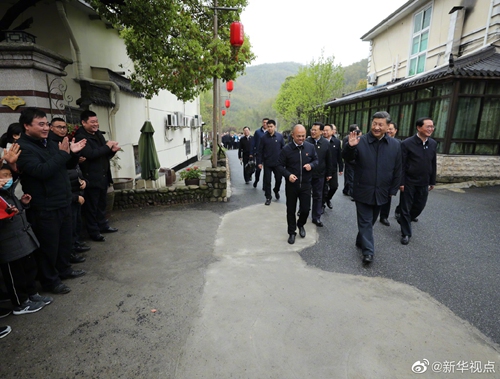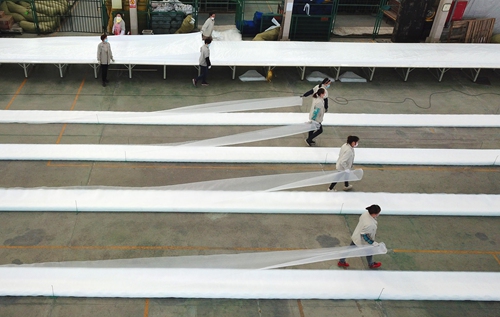Xi’s Zhejiang tour boosts companies’ confidence
Business wary as economy ramps up in fits and starts

Chinese President Xi Jinping talked with villagers in Anji county in East China's Zhejiang Province on Monday without wearing a mask, which was in line with the latest #COVID19 prevention policy in Zhejiang. The province allows people to visit tourist sites without masks if not in mass gatherings as progress is being made against the coronavirus. Photo: Xinhua
For a large part of China's working population that has reluctantly hidden their ambition to get back to business at full speed behind their face masks, a picture of Chinese President Xi Jinping appear-ing in public without wearing a mask will definitely be a shot in the arm.The photo was one of 10-plus posted by the Xinhua News Agency of an inspection tour Xi made on Sunday to industrial and port facilities in East China's Zhejiang, a province known for its vibrant private economy.
Interpreting the photo as a highlight of China's scientific approach to virus containment, experts called for a tough balance between reining in the disease and recommencing the economy, a dual task being performed by a multitude of enterprises that have been plagued by the COVID-19 epi-demic in the country.
Nationwide efforts to restart the coronavirus-battered Chinese economy seem to have proceeded by fits and starts amid an explosion in confirmed cases in Europe and the US, with authorities and in-dustry insiders voicing concerns over the plight of life services providers and exporters, as well as small and micro businesses.
Still, a reassuring message sent by Xi from the frontline workplace inspection, seen as a push by China's leadership to supervise and chart the course of the nation's economic revival while contain-ing the virus in a dynamic fashion, has revitalized the country for its fight on both the virus and economic fronts.

Chinese President Xi Jinping talked with villagers in Anji county in East China's Zhejiang Province on Monday without wearing a mask, which was in line with the latest #COVID19 prevention policy in Zhejiang. The province allows people to visit tourist sites without masks if not in mass gatherings as progress is being made against the coronavirus. Photo: Xinhua
On Sunday, Xi visited Ningbo-Zhoushan Port and an industrial park for auto parts and molds in Ningbo, East China's Zhejiang Province, to inspect the progress in the resumption of work and pro-duction, the Xinhua News Agency reported.The aforementioned photo saw Xi not wearing a mask in publicfor the first time since the onset of the virus outbreak.
Xi was seen holding an umbrella in the rain, standing at a certain distance from anyone else, all without face masks. In the rest of the photos taken mostly indoors, everyone is wearing a mask.
Being picture without a mask does not indicate that now is time to breathe a sigh of relief over the nation's virus containment, the People's Daily said in an article on Monday.
The gesture shows a scientific approach toward tackling the disease, said the article, noting that the photo was taken in an open space in the port with those portrayed distancing themselves from oth-ers.
Striking a balance between virus containment and economic reboot is a new test for the economy, experts said.
Virus prevention and work resumption cannot be separated at this stage, but they must be carefully coordinated in a bid to inject fresh impetus to China's economic development, Cong Yi, a professor at Tianjin University of Finance and Economics, told the Global Times on Monday.
Cong noted that to ensure a rational work resumption under a severe overseas pandemic situation, the Chinese central government and local authorities should now design more targeted support poli-cies for different industries and enterprises to realize a full resumption of work across the country more effectively.
By Sunday, 76.8 percent of the country's small and medium-sized enterprises (SMEs) had resumed work and production, Liang Zhifeng, an official with the Ministry of Industry and Information Technology (MIIT), said at a press conference on Monday.
The factory and construction sectors have posted higher resumption rates than manufacturing-related services industries, while life services providers face more hardships in resuming operations compared to manufacturing services businesses. Exporters face mounting pressure from the spread of the pandemic outside of China, Liang said.
SMEs with specific, unique and innovative prowess have resumed work at a higher rate than the overall average, the MIIT official disclosed.
Large businesses have reported a higher rate of work resumption, while it is harder for micro businesses to resume work and production.

Workers are producing insect-proof bags for date palms that would be exported to Tunisia in Lianyungang, East China's Jiangsu Province on Monday. Photo: cnsphoto
Data provided on Monday by Xin Guobin, vice minister of the MIIT, showed that major Chinese industrial firms had recorded an average reopening rate of 98.6 percent by Saturday, and an average of 89.9 percent of their employees had returned to work.
But restaurants are only serving 50 percent of their usual customer numbers as most people, still afraid of possible coronavirus infection, dare not eat out - though plenty of disinfection work has been carried out, Liu Renjun, owner of the Hunan Xiangjun Catering Co, told the Global Times on Monday.
Liu said the weeklong Spring Festival holidays should have been peak season for the restaurant business, but he has seen no income for the last two months.
"Our cash flow is gradually recovering with millions in the account, but that is because we haven't yet paid our suppliers," Liu said, adding that many of his peers have closed their businesses due to cash flow issues and being unable to take out loans.
In efforts to relieve the pinch felt by SMEs, the MIIT on Monday said it has pushed for government bodies to lower the rate of value added tax for small taxpayers, reduce social security payouts and postpone housing provident funds which are supposed to be paid by companies, among a raft of other fiscal and financial measures.
In a coordinated push, 92 leading companies have played their parts in getting over 400,000 up-stream and downstream SMEs humming again.
The industry watchdog also disclosed on Monday that more than 200 billion yuan ($28.19 billion) of the special-purpose refinancing for key companies tasked with virus containment and prevention has been granted to over 5,000 businesses.
Significantly, lingering fears over the rapid spread of the coronavirus pandemic means that bigger Chinese cities, especially Beijing, are still on edge over the risk of imported infections, which has resulted in resumption setbacks for life services providers.
Just days after reopening, cinemas and karaoke parlors across the country were shuttered again.
"We've shut down three branches in Shenzhen since we could not afford the rent - which is hun-dreds of thousands of yuan every month for each branch - together with operational costs of about 300,000 yuan for each branch," an employee of an education institution surnamed Zhu in Shenzhen, South China's Guangdong Province, told the Global Times on Monday on condition of anonymity.
The employee said their training center has been closed for three months as the education industry is not yet allowed to resume work due to the virus.
The country's exporters, which have largely resumed work following sprawling efforts over the past weeks, have also expressed new concerns over overseas customers, which may not be able to pay invoices due to the global pandemic. If the pandemic continues to spread, they may soon "be forced to take a holiday."
"Full production has been resumed for two weeks, with all employees back to their positions and ramping up efforts to complete orders placed before the Spring Festival holidays," Li Xiaozhao, owner of a small-scale furniture factory in Dongguan, South China's Guangdong Province, told the Global Times on Monday.
"But we're expecting a sharp decline in orders, even a possible drop to zero, by mid-April or May, given the current pandemic situation. We might have to ask our workers to take a break," Li said.
A manager of a shoe manufacturer in Guangzhou surnamed Xie told the Global Times on Monday that two important industry expos scheduled for March and April, at which his company had planned to exhibit, have been postponed. The expos are significant events for the firm to find or-ders.
If foreign orders continue to decline or even drop to zero, it would "cause much trouble for us," Xie said.
Fully aware of the pressure and impacts of the global pandemic on the country's exporters, officials on Monday vowed to help affected businesses in two ways: Stimulate demand and strengthen poli-cy support.
"For instance, we will work with several industry associations and e-commerce platforms to promote consumption by organizing special online sales activities for enterprises related to textiles, clothing, light industrial products, toys and furniture," Xin said.
The government is also considering ways to organize online industry exhibitions to help firms gain orders, the vice minister said.
Experts cautioned that as a yet-to-recover domestic consumption market and declining overseas or-ders may push back many firms' willingness to resume work, it is urgent for firms and authorities to explore emerging business opportunities and potential consumption demands amid the COVID-19 situation.
Firms could change their operation plans or add production lines to emerging industries if needed, Dong Dengxin, director of the Finance and Securities Institute at Wuhan University, told the Global Times on Monday.
"For instance, the catering industry, which has been hit hardest during the virus and may not see a full recovery in the short term, could resort to online service expansion instead of just closing down," Dong said.
As for exporters who heavily rely on overseas markets, apart from waiting for policy support from the government, they should prepare well, for example, looking to domestic sales, Dong noted.
"We still don't know when we will recover fully, as it is largely dependent on the virus situation both at home and abroad, but we can be proactive, both on the government side and the corporate side, to tide us over the difficult time and strive for a real 'spring time,'" Dong said.